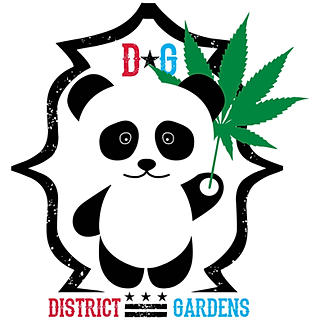D.C. Mayor Muriel Bowser unveils bill to legalize recreational marijuana sales
- District Gardens Team
- May 3, 2019
- 4 min read

D.C. Mayor Muriel E. Bowser (D) announced legislation Thursday to legalize and regulate recreational marijuana dispensaries in the nation’s capital, setting up a potential showdown with the federal government.
The District’s marijuana laws are in limbo. Residents may grow and possess small amounts of the drug under a 2014 voter-approved law. But they cannot legally purchase pot, and the city cannot tax sales because of a provision in the federal budget that prohibits the District from enacting or enforcing marijuana legalization laws.
Advocates have been hopeful that Congress would strip the anti-marijuana language — which originated with House Republicans — from the federal budget now that Democrats control the House. But it is unclear whether the next spending plan will pass before the 2020 elections.
The mayor wants to get moving on legalization before then.
“We want to be able to regulate, we want to be able to make sure we are collecting our fair share in taxes, we want to invest those taxes in ways that affect communities that have been disproportionately affected, and we want to train and hire D.C. residents,” Bowser said in an interview Wednesday with The Washington Post at a medical marijuana cultivation center.
Rep. Andy Harris (R-Md.), who led the charge to stop the District from legalizing marijuana, suggested that the mayor’s office may be violating federal law by drafting legalization legislation while the budget restrictions are in effect.
“Mayor Bowser should respect the Constitution, which gives Congress absolute authority over the District of Columbia, and discontinue her efforts to legalize marijuana in violation of the law,” Harris said in a statement.
Bowser has accused Harris of abusing his congressional powers.
The mayor’s 69-page “Safe Cannabis Sales Act” would rename the Alcoholic Beverage Regulation Administration and task the agency with licensing and overseeing marijuana businesses.

The city’s eight medical marijuana cultivation centers also would be authorized to grow the drug for recreational purposes if Bowser’s bill passes. Regulators would be able to issue additional licenses six months after the law takes effect, but marijuana businesses would not be concentrated in specific neighborhoods, and they would have to have discreet signs.
“We are not going to be a marijuana destination,” Bowser said. “We will not be promoting it. We want D.C. residents to be able to have the choice to buy legally, and we also want to drive out the illegal market, which we know can promote violence in our communities.”
The minimum age to purchase marijuana would be 21. The bill would also crack down on attempts to avoid the existing restrictions on selling marijuana by offering it as a gift in exchange for purchasing clothing, artwork or other items.
Bowser wants to impose a 17 percent sales tax on marijuana products, with revenue funding enforcement of marijuana laws and affordable housing programs. Home delivery would be permitted.
The mayor’s bill does not allow for smoking at rooftop bars, sidewalk patios or at other private businesses, but it gives regulators an opportunity to allow marijuana consumption at dispensaries and at hookah lounges.
The D.C. Council briefly attempted to legalize pot clubs in 2016 but backtracked after concerns from Bowser.
Home growing and a separate medical marijuana program would be preserved under the bill, with patients paying lower taxes than those who buy recreationally.

There has been legal dispute about whether local officials can consider marijuana legalization.
In 2015, Attorney General Karl A. Racine (D) warned the D.C. Council that even holding a hearing on a marijuana legalization bill would violate federal restrictions and place city employees in legal jeopardy. But on Thursday, Racine’s office backtracked from that opinion and said local elected officials could lawfully discuss and hold hearings on the marijuana legislation.
The legislative process, which includes public hearings and multiple votes, can take more than a year for a complex bill. The mayor and lawmakers are looking at beginning that work this year but waiting until Congress drops its anti-marijuana provisions to vote on the bill’s final passage.
“That won’t stop our introduction, and it certainly won’t stop the council’s discussion and action,” Bowser said.
Council Chairman Phil Mendelson (D) said that lawmakers will hold hearings on legalization but that residents should not get their hopes up for quick action as long as the congressional prohibition remains law.
“It’s a ridiculous situation: that citizens may possess small quantities of cannabis, but it’s illegal to buy it,” Mendelson said in a statement. “Thanks, Congress.”
The legalization of marijuana in other states has been fraught with racial dynamics. Some have complained that the industry is dominated by white-owned businesses, even though African Americans have historically been disproportionately locked up for drug offenses.
To address equity concerns, Bowser’s bill would automatically seal the records of people with misdemeanor marijuana possession convictions and would allow them to work in the industry. It also requires 60 percent of marijuana companies’ owners and workforces to be D.C. residents, although those provisions would not apply to existing medical marijuana businesses.
The legislation does not go as far as other jurisdictions have in specifically setting aside licenses for minority-owned businesses, but such firms could benefit from city contracting rules giving extra weight to their applications.
Alternative marijuana legalization legislation by council member David Grosso (I-At Large) would go further in expunging criminal records and also contains provisions to help businesses operating in the black market to transition to legal operations.
“I’m glad to see the mayor has joined us,” Grosso said.
The District would be the first jurisdiction in the Mid-Atlantic with a full-fledged legal marijuana market if Bowser’s bill passes. Ten states have legalized recreational marijuana: the entire West Coast, Alaska, Nevada, Colorado, Maine, Vermont, Massachusetts and Michigan.
Nearby Maryland has a robust medical marijuana program, while Virginia is setting one up.





Comments